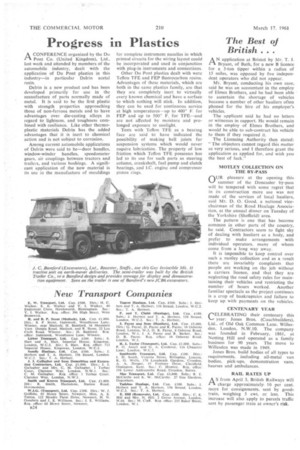Progress in Plastics
Page 58

If you've noticed an error in this article please click here to report it so we can fix it.
A CONFERENCE organized by the Du 1-1 Pont Co. (United Kingdom), Ltd., last week and attended by members of the automobile industry, dealt with the application of Du Pont plastics in this industry—in particular Delrin acetal resin.
Delrin is a new product and has been developed primarily for use in the manufacture of parts normally made of metal. It is said to be the first plastic with strength properties approaching those of non-ferrous metals and to have advantages over die-casting alloys in regard to lightness, and toughness combined with resilience. Like other thermoplastic Materials De'tin has the added advantages that it is inert to chemical action and is not subject to corrosion.
Among current automobile applications of Delrin were said to be—door handles, window-winder handles, speedometer gears, air couplings between tractors and trailers, and various bushings. A significant application of the new material is its use in the manufacture of mouldings for complete instrument nacelles in which printed circuits for the wiring layout could be incorporated and used in conjunction with plug-in instruments and connections.
Other Du Pont plastics dealt with were Teflon TFE and FEP fluorocarbon resins. Advantages of these materials, which are both in the same plastics family, are that they are completely inert to virtually every known chemical and have a surface to which nothing will stick. In addition, they can be used for continuous service at high temperatures—up to 400° F. for FEP and up to 500° F. for TFE—and are not affected by moisture and prolonged exposure to sunlight.
Tests with Teflon TFE as a bearing face are said to have indicated the possibility of making ball joints for suspension systems which would never require lubrication. The property of low friction which Teflon TFE possesses has led to its use for such parts as steering column, crankshaft, fuel pump and clutch bearings, and I.C. engine and compressor piston rings.




































































































































